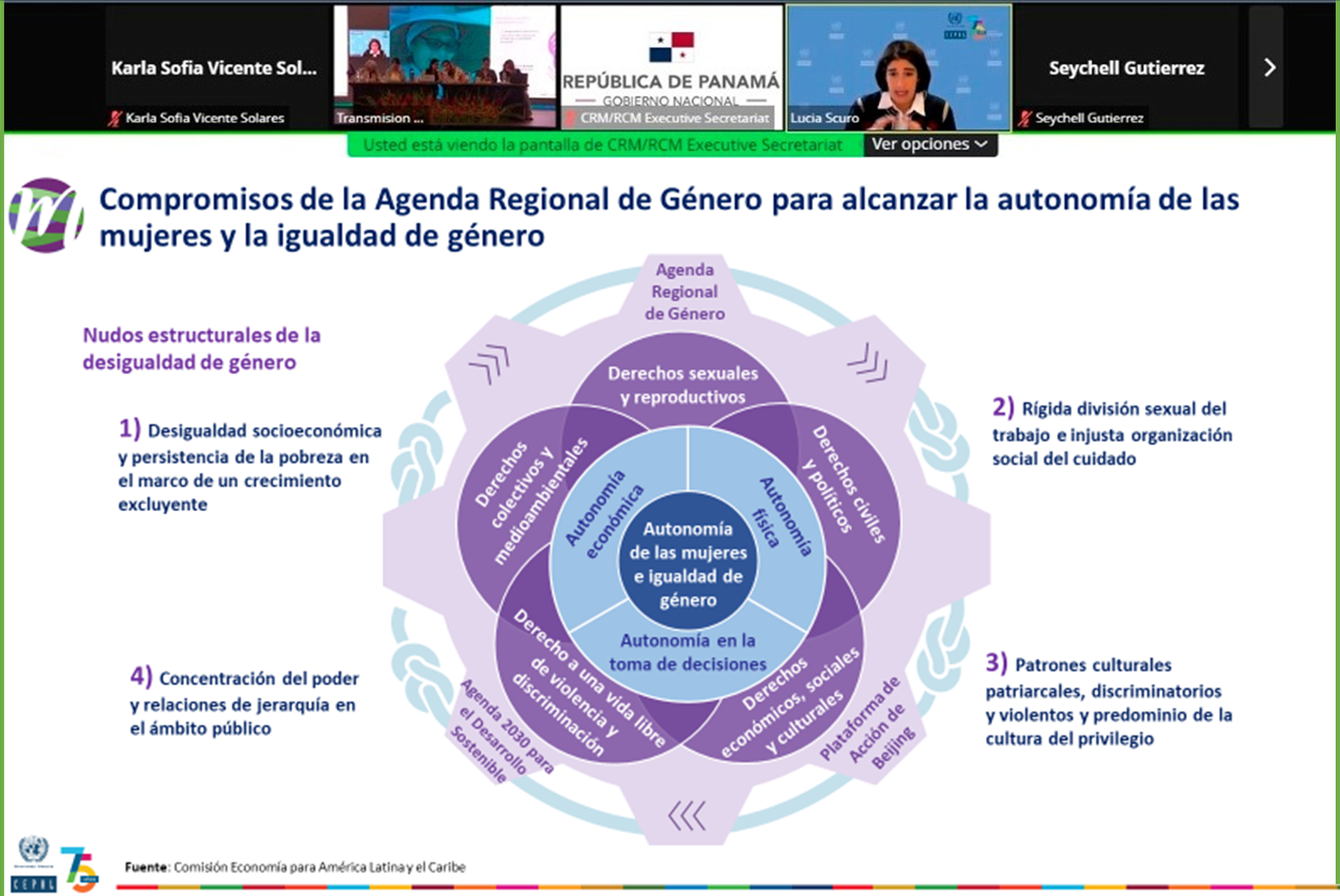ECLAC highlights regional agreements to guarantee women’s rights at all stages of the migration cycle
Work area(s)
Topic(s)
Within the framework of the V Regional Congress of Women in the Contexts of Migration: “Migration has a woman’s face: for the respect and integrity of their rights”, took place the thematic table: Towards comprehensive care systems, in which participated Lucía Scuro, Senior Social Affairs Officer of ECLAC's Division for Gender Affairs.

On the occasion of the event that was held on July 6 and 7, 2023 in Panama City, with the support of the International Organization for Migration (IOM), the Grand Duchy of Luxembourg, the Immigration, Refugees and Citizenship Canada (IRCC) and the Office of the High Commissioner for Refugees (UNHCR), took place the thematic table 5: Towards comprehensive care systems, advances in Latin America, in which participants exchanged on regional and national commitments and experiences to promote gender equality and guarantee respect and integrity of women's rights in the contexts of migration.
The event was attended by Cecilia Alemany, Officer in Charge of the Regional Office of the United Nations Entity for Gender Equality and the Empowerment of Women (UN-Women) for the Americas and the Caribbean; Lucía Scuro, Senior Social Affairs Officer of ECLAC's Division for Gender Affairs; María Inés Castillo, Minister for Social Development of Panama; Yazmín Pérez Haro, Director of Innovation and Special Projects at the National Women’s Institute (INMUJERES) of Mexico, Alba Goycoechea, representative of the Secretariat of the South American Conference on Migration (SACM), and Mariana Pineda Muñoz, Regional Project Coordinator on labor migration of the International Labour Organization (ILO).
In her presentation, the Senior Social Affairs Officer of ECLAC’s highlighted that commitments of the Regional Gender Agenda to achieve women's autonomy and gender equality, and the keys to guarantee women's rights at all stages of the migration cycle, in a context of cascading crises that exacerbate the structural challenges of gender inequality in the region, that affect particularly migrants’ women.
Scuro emphasized the agreements related to migration and gender equality of the Buenos Aires Commitment, adopted by the governments of the region during the XV Regional Conference on Women in Latin America and the Caribbean in November 2022, and the pillars for implementing the Regional Gender Agenda within the Sustainable Development framework by 2030 of the Montevideo Strategy, adopted during the XII Regional Conference on Women in Latin America and the Caribbean in 2017. In addition, the Senior Officer for Social Affairs stressed that the importance of generating regional cooperation efforts for the monitoring and evaluation of the measures adopted, as well as to resolve the issue of financing migration policies.
Finally, Scuro highlighted four essential elements adopted in the Buenos Aires Commitment, which are indispensable for migrations to be increasingly safe and within the framework of human rights . First, the comprehensive approach to migration cycle, which considers not only the arrival of migrant, displaced, refugee and asylum-seeking women, but also their previous and subsequent displacement, as well as their specific integration at destination countries. Second, the collective approach and the subregional, regional, and multilateral cooperation between countries to address the challenges involved in the displacements and movements of migrant women. Third, the participation of the national machineries for the advancement of women in all stages in the design and implementation of migration policies. Finally, the fundamental role played by non-governmental organizations, particularly women’s and feminist organizations and movements, which have been involved in migration processes from a place of denunciation, reception, refuge, and counselling for migrant women.
Related links:
PPT: Buenos Aires Commitment: keys to guarantee the rights of women in all stages of the migratory cycle (available in Spanish)
OIM News: The Regional Conference on Migration (CRM) reiterates its commitment to promoting gender equality and the empowerment of girls and women in migratory contexts (available in Spanish)
